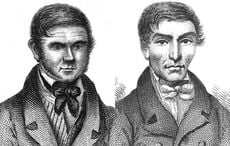Findmypast is working in partnership with IrishCentral to share fascinating insights into your Irish ancestors. Click here to get a special half price subscription, and discover your Irish roots today!
'Relight the flame of the Irish rebellion.' A cry for action - by any means necessary - for the Irish Republican Brotherhood, known commonly as the Fenian Brotherhood. Founded in 1853, this secret society had deep roots in the United States. What began between two Irish men exiled to France became an organization that had the support of thousands of Irish Americans, before, during and after the Civil War.
Their goal, as an organization, was part of the "old American tradition of supporting Irish (Fenian) separatist groups on a freelance, local-fund-raising basis." (Alan Axelrod, The International Encyclopedia of Secret Societies and Fraternal Orders, page 135. Checkmark Books, New York, New York, 1997.) The general idea was that by having a division in Ireland and one in the United States, they could enlist members, raise funds, and develop their plans as two separate factions; then come together when strength and size mattered most. Their methods included everything from the mundane to the military. Their status as a "secret society" does not, however, limit the possibilities for research as a part of your family story.
An easy route to understanding your ancestor's role in an organization such as the Fenian Brotherhood can be as simple as searching through historic newspapers on Findmypast. Among the thousands of articles identified, remember to search in the U.S, Irish, and British newspaper collections, as you may find mention of the group's activities in various parts of the world being reported back. For example, the Sheffield Independent published a mention on January 10, 1880, that delegates from the U.S. were in Manchester seeking out the possibility of holding a "Confederation of the Fenian Brotherhood of the Old and New Worlds."
The Dublin Evening Mail from September 4, 1866, gives us a transcript of an address issued by General Thomas Sweeney, to the Fenian Brotherhood in America, in which he argues against the media’s attempt to muddy the name of the organization in an upcoming election. A veteran of the Mexican War, where he lost his right arm, and a man who rose to Brigadier General during the Civil War, he was also a prominent leader in the organization.
Many of these articles allow for a great deal of detail to be acquired on your ancestor’s activities. By pulling information from historic newspapers, you can easily create a timeline of events in your area of interest, and then compare that to a timeline of your family.
Newspapers are not the only source, of course, for identifying your ancestor in underground organizations. The collections at Findmypast include criminal and court records, such as the Irish Prison Registers from 1790-1924, which is where we discovered co-founder of the Fenian Brotherhood, and several of his colleagues, being held for high treason. Admitted on November 15, 1865, and held to await trial at the Richmond Prison (Bridewell), he ultimately escaped with the help of a warder who was sworn into the brotherhood (Axelrod, p136).
By piecing together the history of the Irish Republican Brotherhood, you can better understand the political and social movements that your ancestor lived through. Had it not been for the Civil War, which minimized membership numbers and available funding for causes such as this across America, the history books may have been written in a much different way. These organizations were incredibly popular and were quite successful, leading up to the turn of the century. Do not allow the term “secret society” to dissuade you from seeking out the truth in historical resources.
For more stories on tracing your Irish heritage from Findmypast click here.




Comments